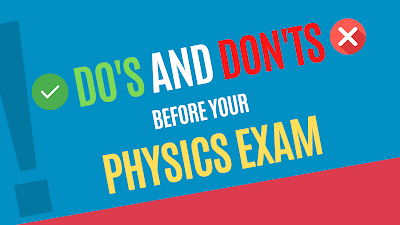Many students are afraid of physics exam because it contains many complex definitions, laws, theories, and derivations, as well as numerical based on all the concepts. Physics is not an easy subject, and you will need to put in a lot of effort to succeed.

Fear not! With some good techniques, you should be able to ace physics even in the toughest exams like JEE and NEET. Here are some Do’s and Don’ts to follow as you study for your physics exam, which will help you in tackling it with ease.
Do’s
1. Make your basics strong
The only way to learn any subject is to understand the fundamental ideas and have a deep interest in learning them. Physics is a subject with many complex ideas and a wide range of practical applications. Your interest in these topics is boosted when you can relate these ideas to actual situations. Start by going through each physics chapter one by one. Even the most complicated theories are based on basic knowledge.
Learning by relating things ensures the retention of that knowledge for a long time. The more you learn, the more doubts you will have. Ask your doubts to your teachers or find their answers by your own. The ultimate aim is to have a clear view and understanding of the subject.
2. Prepare your own study material
You can’t remember things correctly unless you put them in your own words and write them down. Making your own notes will help you feel more knowledgeable about the subject. It won’t help just to make a list and prepare some material. You should write after you understand. Moto should be DIY (Do it yourself).
3. Analyse
Analysing the previous trends and having hands on the previous year’s questions will help you a lot. Not all the chapters or topics are meant to be practised in exam point of view. The weightage of marks, previously asked questions and pattern of the questions will give the idea of the syllabus that you have to cover. There are some topics which have a very small weightage and thus require less practice. So, Analysis is MUST!
4. Focus on both – Concepts & Numericals
The overall weightage of concepts and numericals in physics is 60-40. There are many theoretical chapters in physics that hold a major weightage of marks. But, if you prepare for theories, numericals will definitely be an easy and complimentary add-on to your marks.
5. Start with easy ones
On analyzing the syllabus and previous year’s trends, you should start with the topics that are more familiar to you and hold a significant amount of weightage. Always have a checklist of the chapters that you are going to study.
Picking up the hard chapters at first will require a lot of hard work and thus will give the feeling of incompleteness because of the time you will spend completing that portion. Start with simple, good topics, and move forward gradually.
6. Repeat, Rewrite, Revise
When you have studied and understood all the concepts, write a formula sheet or create a short revision note on each chapter, including all the key topics. To test yourself, just take one random derivation or numerical and practice it in rough by writing. The mistakes that will occur at that time will not be repeated after. Identify such mistakes where you will get stuck. After you have done it all, sit back and RELAX!
Don’ts
1. Don’t rely on textbooks and ready-made study materials completely.
Textbooks and study guides sometimes have disorganized content. There are numerous errors and missing steps throughout. Such references result in inaccurate and lacking information. This issue can be solved by creating your own study notes in a step-by-step manner.
2. Don’t do false analysis.
Referring to many websites for the previous year’s analysis can lead to confusion. This can also lead you to improper planning of topics. To avoid this, always verify the data you are taking for your analysis by referring to the previous year’s question papers.
3. Don’t study continuously without taking a break
Many believe studying all night and having cram sessions will help them get good grades. But it’s a fact that skipping breaks can have a negative impact on one’s academic performance and, in some cases, even cause health issues like anxiety and depression. To avoid this, set small goals throughout the day by breaking down a big chapter into small topics.

Regardless of how extensive or varied the syllabus may be, having a well-organised study plan is the key to acing a physics exam. Practice is the key. The more you practice, the more comfortable and confident you will feel when sitting down for your physics exam.
All the best!
Writer – Girish Hedau
Scientific Content Writer – Physics

